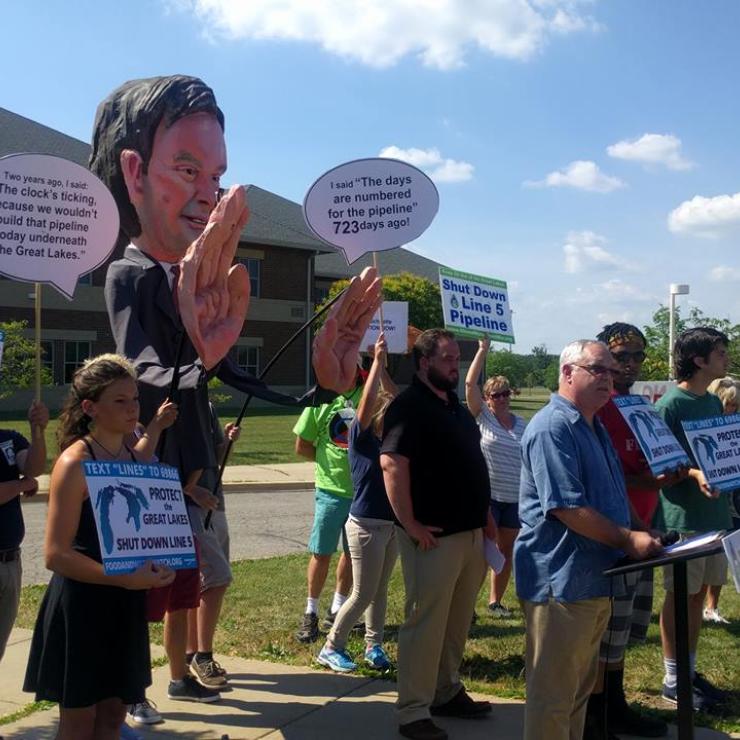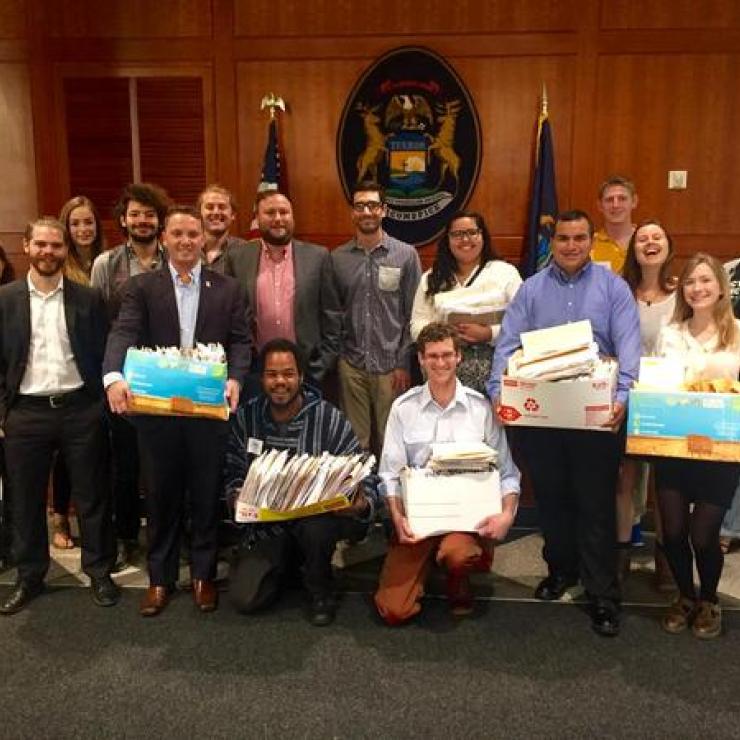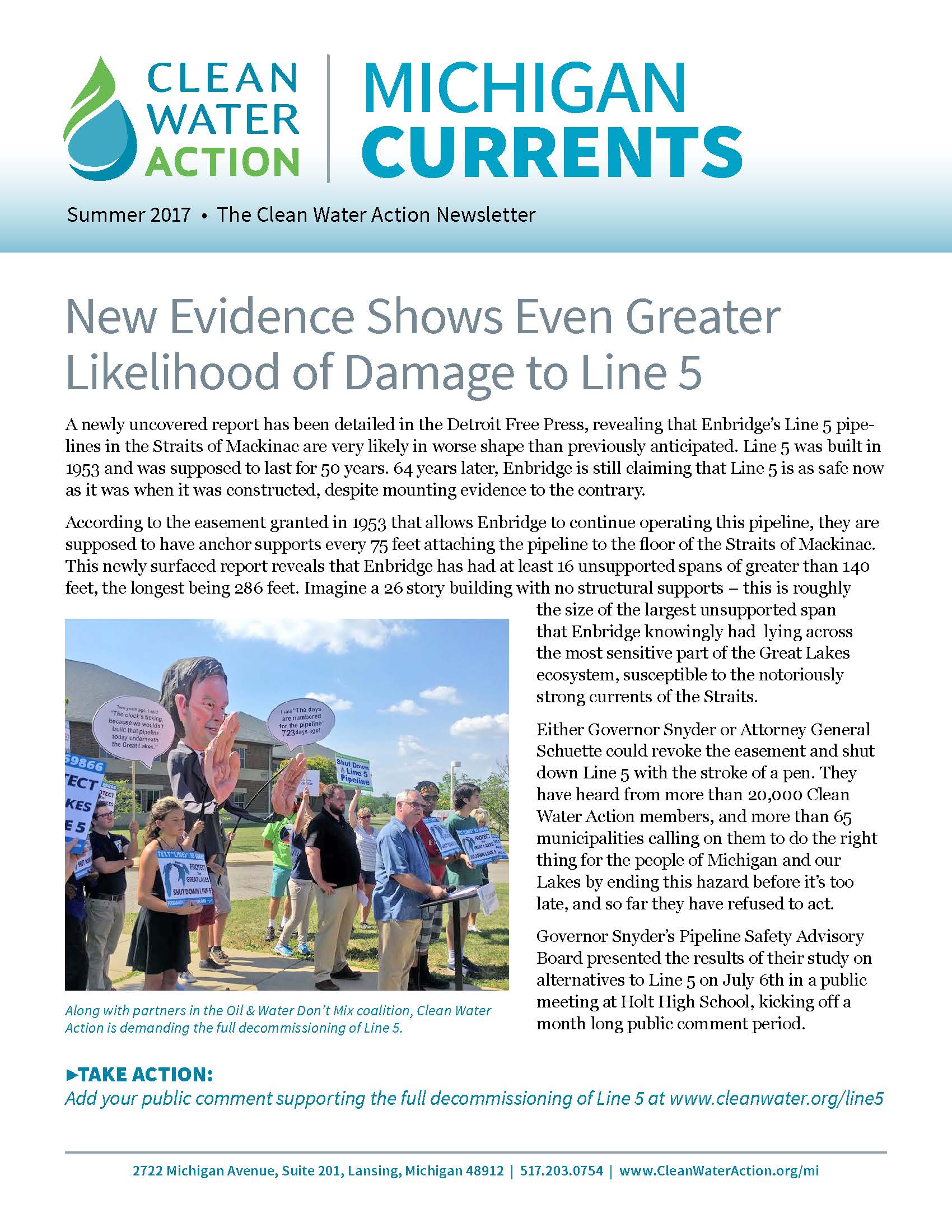In this issue:
- New Evidence Shows Even Greater Likelihood of Damage to Line 5
- Victory for Clean Energy and the Great Lakes
- Nestle Trying to Increase Water Consumption...Again
- Transitioning Michigan’s Utilities from Coal to a Clean Energy Future
- 2017 Great Lakes Awards Celebration
New Evidence Shows Even Greater Likelihood of Damage to Line 5
A newly uncovered report has been detailed in the Detroit Free Press, revealing that Enbridge’s Line 5 pipelines in the Straits of Mackinac are very likely in worse shape than previously anticipated. Line 5 was built in 1953 and was supposed to last for 50 years. 64 years later, Enbridge is still claiming that Line 5 is as safe now as it was when it was constructed, despite mounting evidence to the contrary.
According to the easement granted in 1953 that allows Enbridge to continue operating this pipeline, they are supposed to have anchor supports every 75 feet attaching the pipeline to the floor of the Straits of Mackinac. This newly surfaced report reveals that Enbridge has had at least 16 unsupported spans of greater than 140 feet, the longest being 286 feet. Imagine a 26 story building with no structural supports – this is roughly the size of the largest unsupported span that Enbridge knowingly had lying across the most sensitive part of the Great Lakes ecosystem, susceptible to the notoriously strong currents of the Straits.
Either Governor Snyder or Attorney General Schuette could revoke the easement and shut down Line 5 with the stroke of a pen. They have heard from more than 20,000 Clean Water Action members, and more than 65 municipalities calling on them to do the right thing for the people of Michigan and our Lakes by ending this hazard before it’s too late, and so far they have refused to act.

Governor Snyder’s Pipeline Safety Advisory Board presented the results of their study on alternatives to Line 5 on July 6th in a public meeting at Holt High School, kicking off a month long public comment period.
▶TAKE ACTION: Add your public comment supporting the full decommissioning of Line 5
Victory for Clean Energy and the Great Lakes
The 98th Michigan Legislature passed a landmark package of bills in the lame duck session of 2016, expanding renewable energy, and protecting ratepayers and the Great Lakes. Bipartisan support increased the Renewable Portfolio Standard (RPS) from 10% by 2015 to 15% by 2022, with an interim mandate of 12.5% by 2019. The mandate requires utilities to increase investment in clean energy and create local jobs for Michiganders. Clean Water Action spent countless hours in Lansing advocating for an increase in clean energy to decrease our dependency on carbon-intensive generation and pollution from coal-fired power plants. This campaign spanned nearly a decade with victories and battles along the way, finally culminating in a victory for clean energy.
Thanks to the activism of Clean Water Action members, the legislature backed away from their plan to redefine renewable energy to include burning toxic waste and tires, neither of which are clean energy. Over the course of our campaign, Clean Water delivered more than 25,000 letters and actions demanding the legislature maintain the definition of clean energy as technology such as wind and solar, and maintained a Renewable Portfolio Standard to hold utilities accountable for their generation investments.

2017 presents new challenges and threats to our Great Lakes, and Clean Water Action will again be on the front line in Lansing and Washington D.C., fighting for water protection and a clean energy future. Without the support and engagement of Clean Water members, Michigan’s elected officials would make decisions based on corporate interests, be influenced by fossil fuel industry lobbyists, and fail to protect our most valuable resource — The Great Lakes. Let’s continue the fight in 2017 and beyond together!
Nestle Trying to Increase Water Consumption...Again
In May of 2002, the Swiss company Nestle began extracting and bottling water in the state of Michigan. Their Michigan plants bottle spring water for their regional brand Ice Mountain and purified water for the national brand Nestle Pure Life. Nestle originally applied for a permit to extract 400 gallons per minute from the Michigan aquifers. However, after a lengthy legal battle with Michigan Citizens for Water Conservation (MCWC) they reached a settlement that allowed them to bottle 218 gallons per minute.
For many Michiganders the lawsuit raised concerns about the continued privatization of our water, which belongs to all of us and should not be used for private financial gain. However, that was eight years ago. Now, Nestle is making another attempt to secure the 400 gallon per minute permit that they initially requested. The public comment period for this application recently came to a close, and the Michigan Department of Environmental Quality (DEQ) will be issuing their ruling soon. Clean Water Action members submitted more than 7,500 comments opposed to granting Nestle’s permit, and encouraging DEQ to stand up for Michigan residents and our water, not private corporations like Nestle.
Nestle does not compensate the state or its taxpayers for the use of the water. Water is Michigan’s most important natural resource, and Nestle is consuming it at a rate of over 300,000 gallons per day already. If DEQ approves this increase, Nestle’s consumption would jump to over 500,000 gallons per day. The total annual compensation the state receives from Nestle for the consumption of all that water is $200 — essentially nothing.
While any amount of high water consumption is not ideal for the environment, the 218 gallons per minute mark was thought to prevent the most severe environmental damage that is possible at a higher, less sustainable, rate of consumption. There have not been significant changes in water consumption practices by Nestle or any technological advances that make a higher rate of consumption more sustainable now than it was then. So, if nothing has changed why should DEQ allow Nestle to increase consumption of our finite fresh water supply by more than 60 percent?
Transitioning Michigan’s Utilities from Coal to a Clean Energy Future
2016-2017 brought a major victory for Clean Water Action’s long fight against carbon-intensive energy generation. DTE Energy CEO Gerry Anderson recently said climate change is “a defining policy issue of our era.” His company’s answer for addressing the problem: Close coal-fired power plants and expand investments in clean, renewable energy. DTE’s announcement will close all of its coal-fired power plants by 2050. Thanks to the tremendous pressure on DTE from Clean Water Action members, this announcement is a major victory for our air, land and Great Lakes.
Michigan’s largest utility, DTE Energy, also announced it will expand investments in clean, renewable energy and reduce 80 percent reduction of its carbon emissions by 2050. These plans will help rein in rising electricity costs for ratepayers. Prices for clean energy continue to fall year after year. In fact, wind and solar energy generation is now cheaper than natural gas and coal, which means now is the time to increase investments in clean energy.
Michigan has the highest electricity prices in the Midwest, which is why Clean Water Action continues to advocate for clean energy investments by utility companies. Expanding investments in clean, renewable energy will help lower electricity costs and put more money in the pockets of families.
Expanding clean, renewable energy jobs in Michigan stimulates our growing clean energy economy. Michigan’s clean energy sector already sparks more than 87,000 jobs and $5 billion in annual economic activity. DTE’s announcement is good news for Michigan. Boosting investments in renewable energy will create jobs that can’t outsourced to other states.
For families, children, and seniors, this will mean improved air quality and better respiratory health. Asthma and lung disease affect more than 232,000 kids and 724,000 adults statewide, leading to an asthma rate 10 percent higher than the national average. Using more sources of clean, renewable energy will reduce dangerous pollution in our air and water, lower the risk of asthma and lung diseases and ultimately save lives. DTE’s commitment to cleaner air and water will protect the health of families, children and seniors for years to come.
Moving away from carbon-intensive generation, toward renewable energy helps fight climate change by reducing dangerous pollution in our air and Great Lakes. A rapidly changing climate causes more extreme weather events, like droughts, heat waves and flooding. DTE’s commitment to reducing carbon pollution will help protect Michiganders against the dangerous effects of climate change.
2017 Great Lakes Awards Celebration
The Great Lakes Awards Celebration, Clean Water’s largest annual fundraiser in Michigan, was once again a tremendous success thanks to our members and event sponsors. At the event, we had the privilege of honoring several great defenders of Michigan’s environment, meeting with our fantastic supporters, and raising the resources we need to continue fighting to protect the Great Lakes and the environment in Michigan.
This year’s award recipients were Senator Rebekah Warren, Chris Shepler, Nayyirah Shariff, and Bell’s Brewery. Senator Warren received the Champion of the Great Lakes award for her continued legislative work on the Senate Natural Resources Committee to protect our Great Lakes. Chis Shepler of Shepler’s Mackinac Island Ferry was awarded Hero of the Great Lakes for his leadership in the effort to shut down the controversial and aging Enbridge Line 5 pipeline in the Straights of Mackinac. For her work on the ground in response to the Flint Water Crisis and her leadership, Nayyirah Shariff, Executive Director of Flint Rising, received the Great Lakes Guardian Award. Innovator of the Year went to Bell’s Brewery for their sustainable business practices and leadership in the Great Lakes Business Network.
Thank you again to all of the individuals that sponsored and attended the event and to the East Lansing HopCat for hosting.
